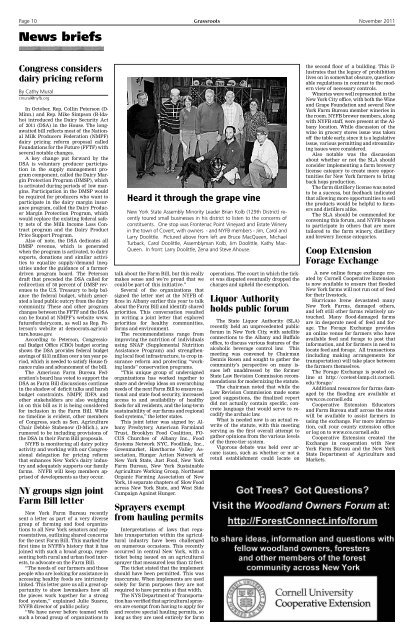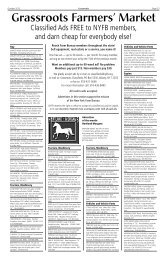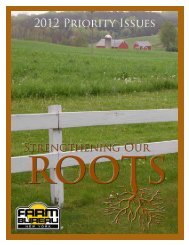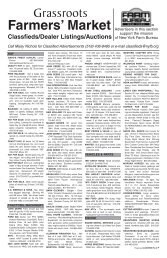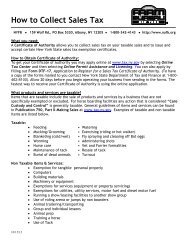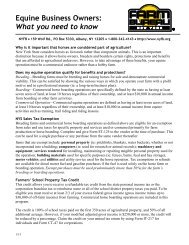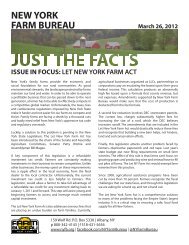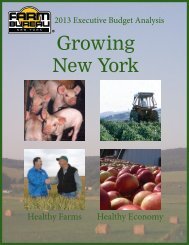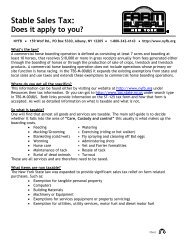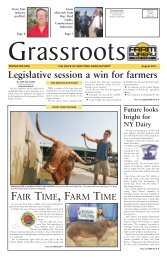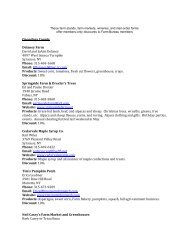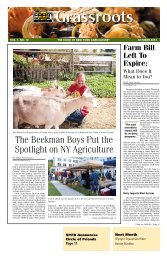Facebook brings a flood of relief to frazzled farmers - New York Farm ...
Facebook brings a flood of relief to frazzled farmers - New York Farm ...
Facebook brings a flood of relief to frazzled farmers - New York Farm ...
Create successful ePaper yourself
Turn your PDF publications into a flip-book with our unique Google optimized e-Paper software.
Page 10 Grassroots November 2011<br />
<strong>New</strong>s briefs<br />
Congress considers<br />
dairy pricing reform<br />
By Cathy Mural<br />
cmural@nyfb.org<br />
In Oc<strong>to</strong>ber, Rep. Collin Peterson (D-<br />
Minn.) and Rep. Mike Simpson (R-Idaho)<br />
introduced the Dairy Security Act<br />
<strong>of</strong> 2011 (DSA) in the House. The longawaited<br />
bill reflects most <strong>of</strong> the National<br />
Milk Producers Federation (NMPF)<br />
dairy pricing reform proposal called<br />
Foundations for the Future (FFTF) with<br />
several notable changes.<br />
A key change put forward by the<br />
DSA is voluntary producer participation<br />
in the supply management program<br />
component, called the Dairy Margin<br />
Protection Program (DMSP), which<br />
is activated during periods <strong>of</strong> low margins.<br />
Participation in the DMSP would<br />
be required for producers who want <strong>to</strong><br />
participate in the dairy margin insurance<br />
program, called the Dairy Producer<br />
Margin Protection Program, which<br />
would replace the existing federal safety<br />
nets <strong>of</strong> the Milk Income Loss Contract<br />
program and the Dairy Product<br />
Price Support Program.<br />
Also <strong>of</strong> note, the DSA dedicates all<br />
DMSP revenue, which is generated<br />
when the program is activated, <strong>to</strong> dairy<br />
exports, donations and similar activities<br />
<strong>to</strong> equalize supply/demand inequities<br />
under the guidance <strong>of</strong> a farmerdriven<br />
program board. The Peterson<br />
draft that preceded the DSA called for<br />
redirection <strong>of</strong> 50 percent <strong>of</strong> DMSP revenues<br />
<strong>to</strong> the U.S. Treasury <strong>to</strong> help balance<br />
the federal budget, which generated<br />
a loud public outcry from the dairy<br />
community. These and other program<br />
changes between the FFTF and the DSA<br />
can be found at NMPF’s website www.<br />
futurefordairy.com, as well as Rep. Peterson’s<br />
website at democrats.agriculture.house.gov.<br />
According <strong>to</strong> Peterson, Congressional<br />
Budget Office (CBO) budget scoring<br />
shows the DSA provides federal budget<br />
savings <strong>of</strong> $131 million over a ten year period,<br />
which is needed <strong>to</strong> satisfy House finance<br />
rules and advancement <strong>of</strong> the bill.<br />
The American <strong>Farm</strong> Bureau Federation’s<br />
board has voted <strong>to</strong> support the<br />
DSA as <strong>Farm</strong> Bill discussions continue<br />
in the shadow <strong>of</strong> deficit talks and harsh<br />
budget constraints. NMPF, IDFA and<br />
other stakeholders are also weighing<br />
in on this bill as it is being considered<br />
for inclusion in the <strong>Farm</strong> Bill. While<br />
no timeline is evident, other members<br />
<strong>of</strong> Congress, such as Sen. Agriculture<br />
Chair Debbie Stabenow (D-Mich.), are<br />
rumored <strong>to</strong> be including provisions <strong>of</strong><br />
the DSA in their <strong>Farm</strong> Bill proposals.<br />
NYFB is moni<strong>to</strong>ring all dairy policy<br />
activity and working with our Congressional<br />
delegation for pricing reform<br />
that enhances <strong>New</strong> <strong>York</strong>’s dairy industry<br />
and adequately supports our family<br />
farms. NYFB will keep members apprised<br />
<strong>of</strong> developments as they occur.<br />
NY groups sign joint<br />
<strong>Farm</strong> Bill letter<br />
<strong>New</strong> <strong>York</strong> <strong>Farm</strong> Bureau recently<br />
sent a letter as part <strong>of</strong> a very diverse<br />
group <strong>of</strong> farming and food organizations<br />
<strong>to</strong> all <strong>New</strong> <strong>York</strong> sena<strong>to</strong>rs and representatives,<br />
outlining shared concerns<br />
for the next <strong>Farm</strong> Bill. This marked the<br />
first time in NYFB’s his<strong>to</strong>ry that it has<br />
joined with such a broad group, representing<br />
both rural and urban food interests,<br />
<strong>to</strong> advocate on the <strong>Farm</strong> Bill.<br />
“The needs <strong>of</strong> our <strong>farmers</strong> and those<br />
people who are looking for assistance in<br />
accessing healthy foods are intricately<br />
linked. This letter gave us all a great opportunity<br />
<strong>to</strong> show lawmakers how all<br />
the pieces work <strong>to</strong>gether for a strong<br />
food system,” explained Julie Suarez,<br />
NYFB direc<strong>to</strong>r <strong>of</strong> public policy.<br />
“We have never before teamed with<br />
such a broad group <strong>of</strong> organizations <strong>to</strong><br />
Heard it through the grape vine<br />
<strong>New</strong> <strong>York</strong> State Assembly Minority Leader Brian Kolb (129th District) recently<br />
<strong>to</strong>ured small businesses in his district <strong>to</strong> listen <strong>to</strong> the concerns <strong>of</strong><br />
constituents. One s<strong>to</strong>p was Frontenac Point Vineyard and Estate Winery<br />
in the <strong>to</strong>wn <strong>of</strong> Covert, with owners - and NYFB members - Jim, Carol and<br />
Larry Doolittle. Pictured above from left are Bruce MacQueen, Michael<br />
Turback, Carol Doolittle, Assemblyman Kolb, Jim Doolittle, Kathy Mac-<br />
Queen. In front: Larry Doolittle, Zena and Steve Ahouse.<br />
talk about the <strong>Farm</strong> Bill, but this really<br />
makes sense and we’re proud that we<br />
could be part <strong>of</strong> this initiative.”<br />
Several <strong>of</strong> the organizations that<br />
signed the letter met at the NYFB <strong>of</strong>fices<br />
in Albany earlier this year <strong>to</strong> talk<br />
about the <strong>Farm</strong> Bill and identify shared<br />
priorities. This conversation resulted<br />
in writing a joint letter that explored<br />
priorities for healthy communities,<br />
farms and environment.<br />
The recommendations range from<br />
improving the nutrition <strong>of</strong> individuals<br />
using SNAP (Supplemental Nutrition<br />
Assistance Program) and strengthening<br />
local food infrastructure, <strong>to</strong> crop insurance<br />
reform and protecting “working<br />
lands” conservation programs.<br />
“This unique group <strong>of</strong> undersigned<br />
organizations has worked <strong>to</strong>gether <strong>to</strong><br />
share and develop ideas on overarching<br />
needs <strong>of</strong> the next <strong>Farm</strong> Bill <strong>to</strong> ensure national<br />
and state food security, increased<br />
access <strong>to</strong> and availability <strong>of</strong> healthy<br />
foods for all residents, and the long-term<br />
sustainability <strong>of</strong> our farms and regional<br />
food systems,” the letter states.<br />
This joint letter was signed by: Albany<br />
Presbytery, American <strong>Farm</strong>land<br />
Trust, Brooklyn Food Coalition, FO-<br />
CUS Churches <strong>of</strong> Albany Inc., Food<br />
Systems Network NYC, Foodlink, Inc.,<br />
Greenmarket, Hawthorne Valley Association,<br />
Hunger Action Network <strong>of</strong><br />
<strong>New</strong> <strong>York</strong> State, Just Food, <strong>New</strong> <strong>York</strong><br />
<strong>Farm</strong> Bureau, <strong>New</strong> <strong>York</strong> Sustainable<br />
Agriculture Working Group, Northeast<br />
Organic <strong>Farm</strong>ing Association <strong>of</strong> <strong>New</strong><br />
<strong>York</strong>, 10 separate chapters <strong>of</strong> Slow Food<br />
across <strong>New</strong> <strong>York</strong> State, and West Side<br />
Campaign Against Hunger.<br />
Sprayers exempt<br />
from hauling permits<br />
Interpretations <strong>of</strong> laws that regulate<br />
transportation within the agricultural<br />
industry have been challenged<br />
on numerous occasions. This recently<br />
occurred in central <strong>New</strong> <strong>York</strong>, with a<br />
ticket being issued on an agricultural<br />
sprayer that measured less than 12 feet.<br />
The ticket stated that the implement<br />
should have been permitted. This was<br />
inaccurate. When implements are used<br />
solely for farm purposes they are not<br />
required <strong>to</strong> have permits at that width.<br />
The NYS Department <strong>of</strong> Transportation<br />
has verified that agricultural sprayers<br />
are exempt from having <strong>to</strong> apply for<br />
and receive special hauling permits, so<br />
long as they are used entirely for farm<br />
operations. The court in which the ticket<br />
was disputed eventually dropped the<br />
charges and upheld the exemption.<br />
Liquor Authority<br />
holds public forum<br />
The State Liquor Authority (SLA)<br />
recently held an unprecedented public<br />
forum in <strong>New</strong> <strong>York</strong> City, with satellite<br />
connections <strong>to</strong> the Albany and Buffalo<br />
<strong>of</strong>fice, <strong>to</strong> discuss various features <strong>of</strong> the<br />
alcoholic beverage control law. This<br />
meeting was convened by Chairman<br />
Dennis Rosen and sought <strong>to</strong> gather the<br />
community’s perspective on many issues<br />
left unaddressed by the former<br />
State Law Revision Commission recommendations<br />
for modernizing the statute.<br />
The chairman noted that while the<br />
Law Revision Commission made some<br />
good suggestions, the finalized report<br />
did not actually contain specific, concrete<br />
language that would serve <strong>to</strong> recodify<br />
the archaic law.<br />
What is needed now is an actual rewrite<br />
<strong>of</strong> the statute, with this meeting<br />
serving as the first overall attempt <strong>to</strong><br />
gather opinions from the various levels<br />
<strong>of</strong> the three-tier system.<br />
Vigorous debate was held over arcane<br />
issues, such as whether or not a<br />
retail establishment could locate on<br />
the second floor <strong>of</strong> a building. This illustrates<br />
that the legacy <strong>of</strong> prohibition<br />
lives on in somewhat obscure, questionable<br />
regulations in contrast <strong>to</strong> the modern<br />
view <strong>of</strong> necessary controls.<br />
Wineries were well represented in the<br />
<strong>New</strong> <strong>York</strong> City <strong>of</strong>fice, with both the Wine<br />
and Grape Foundation and several <strong>New</strong><br />
<strong>York</strong> <strong>Farm</strong> Bureau member wineries in<br />
the room. NYFB brewer members, along<br />
with NYFB staff, were present at the Albany<br />
location. While discussion <strong>of</strong> the<br />
wine in grocery s<strong>to</strong>res issue was taken<br />
<strong>of</strong>f the table early, since it is a legislative<br />
issue, various permitting and streamlining<br />
issues were considered.<br />
Also notable was the discussion<br />
about whether or not the SLA should<br />
consider implementing a farm brewery<br />
license category <strong>to</strong> create more opportunities<br />
for <strong>New</strong> <strong>York</strong> <strong>farmers</strong> <strong>to</strong> bring<br />
back hops production.<br />
The farm distillery license was noted<br />
<strong>to</strong> be a success, but feedback indicated<br />
that allowing more opportunities <strong>to</strong> sell<br />
the products would be helpful <strong>to</strong> <strong>farmers</strong><br />
and distillers alike.<br />
The SLA should be commended for<br />
convening this forum, and NYFB hopes<br />
<strong>to</strong> participate in others that are more<br />
tailored <strong>to</strong> the farm winery, distillery<br />
and brewery license categories.<br />
Coop Extension<br />
Forage Exchange<br />
A new online forage exchange created<br />
by Cornell Cooperative Extension<br />
is now available <strong>to</strong> ensure that <strong>flood</strong>ed<br />
<strong>New</strong> <strong>York</strong> farms will not run out <strong>of</strong> feed<br />
for their lives<strong>to</strong>ck.<br />
Hurricane Irene devastated many<br />
<strong>New</strong> <strong>York</strong> <strong>Farm</strong>s, damaged others,<br />
and left still other farms relatively un<strong>to</strong>uched.<br />
Many <strong>flood</strong>-damaged farms<br />
are in desperate need <strong>of</strong> feed and forage.<br />
The Forage Exchange provides<br />
an online venue for <strong>farmers</strong> who have<br />
available feed and forage <strong>to</strong> post that<br />
information, and for <strong>farmers</strong> in need <strong>to</strong><br />
locate feed and forage. All transactions<br />
(including making arrangements for<br />
transportation) will take place between<br />
the <strong>farmers</strong> themselves.<br />
The Forage Exchange is posted online<br />
at http://ccetest-lamp.cit.cornell.<br />
edu/forage/<br />
Additional resources for farms damaged<br />
by the <strong>flood</strong>ing are available at<br />
www.cce.cornell.edu<br />
Cooperative Extension Educa<strong>to</strong>rs<br />
and <strong>Farm</strong> Bureau staff across the state<br />
will be available <strong>to</strong> assist <strong>farmers</strong> in<br />
using the exchange. For more information,<br />
call your county extension <strong>of</strong>fice<br />
or log on <strong>to</strong> www.cce.cornell.edu<br />
Cooperative Extension created the<br />
Exchange in cooperation with <strong>New</strong><br />
<strong>York</strong> <strong>Farm</strong> Bureau and the <strong>New</strong> <strong>York</strong><br />
State Department <strong>of</strong> Agriculture and<br />
Markets.


